Afghanistan’s Karzai meets US Sen Kerry, says anti-corruption units can operate independently
By Deb Riechmann, APFriday, August 20, 2010
Karzai: Anti-corruption units can be independent
KABUL, Afghanistan — Afghanistan’s president pledged Friday to let Western-backed anti-corruption teams pursue investigations free from political interference following two rounds of candid talks with U.S. Sen. John Kerry that the lawmaker said were marked by “sometimes tough” conversation.
Kerry urged President Hamid Karzai to move quickly to combat corruption or risk losing support in the U.S. Congress at a critical phase in the war. U.S. lawmakers have expressed doubt the military effort can succeed without a serious campaign against bribery and graft that have eroded the Afghan people’s trust in the Karzai government.
Kerry, who heads the Senate Foreign Relations Committee, met twice with Karzai on Tuesday and then returned for a second, unscheduled round of talks Friday after traveling to Pakistan to see areas devastated by massive floods. After the meeting, the two appeared before cameras and Karzai made his first public remarks about two investigative units instrumental in the recent arrest of one of Karzai’s top advisers.
Mohammad Zia Salehi, who has since been released pending charges, was arrested for allegedly accepting a car in exchange for his help in exerting pressure on Afghan officials to ease off in another corruption case. U.S. officials view Salehi’s arrest as a test case of Karzai’s willingness to fight corruption.
Soon after Salehi’s arrest, Karzai met with members of a panel he set up to review the work of the Major Crimes Task Force and the Sensitive Investigative Unit, which conduct corruption probes of high-level Afghan government officials and then feed cases to Afghan prosecutors. Earlier this month, Karzai released a statement saying all cases under investigation or completed should be reviewed by the panel and reported to the president.
That sparked concern that Karzai was attempting to derail corruption probes of top officials in his government.
After his meeting with Kerry, the president said while more work was needed to establish the legal framework for the two units’ work, they should operate independently.
“With regard to the anti-crimes task force and sensitive investigation body, which is of concern to the international community … we will make sure that these bodies are run in accordance with Afghan laws, under the Afghan constitution, and are sovereign as Afghan bodies and independent — absolutely, in full terms — as Afghan bodies, to continue to fight against corruption,” Karzai said.
In a statement released later by the palace, Karzai said he and Kerry agreed the two units, “would always operate as independent sovereign Afghan entities, run by Afghans, allowed to pursue their mission of enhancing transparency and combating corruption free from foreign interference or political influence.”
Heightened pressure on Karzai to clean up corruption within the ranks of his government comes as the last of 30,000 U.S. reinforcements arrive, death tolls are rising and American public support for the war is eroding. A majority of Americans see no end in sight in Afghanistan, and nearly six in 10 oppose the nearly 9-year war, according to a new Associated Press-GfK poll. Just 19 percent expect the situation to improve during the next year, while 29 percent think it will get worse.
Kerry said he believes Karzai knows the American public is tiring of a conflict that has claimed the lives of more than 1,200 U.S. service men and women. The senator said how Karzai addresses corruption is a test because there is “no patience for endless support” for a government that doesn’t meet higher standards with respect to governance.
“I was very heartened to hear the president and the members of his government recommit themselves to significant efforts in the days ahead to guarantee the independent operation of their major crimes unit, as an Afghan institution, a sovereign Afghan institution, which would welcome outside expertise, but which will be run in a way that is consistent with the constitution,” Kerry said.
“The president and I agreed that the work of these entities must be allowed to continue free from outside interference or political influence, including with respect to ongoing cases,” he said.
Kerry said he would pass along to President Barack Obama critical issues raised by Karzai and recommendations he made about how the U.S. can improve the presence of American forces and the fight against insurgents. The Afghan president stood by his decree for the tens of thousands of private security contractors operating in Afghanistan to cease operations in four months.
Karzai also pushed for more transparency in the contracting process and preventing civilian casualties of war. Without mentioning neighboring Pakistan, Karzai also said more must be done to address the “real threat” posed by “sanctuaries” of terrorism outside Afghanistan.
Kerry acknowledged their discussions about insurgents who plot attacks in Afghanistan from across the border in Pakistan where international forces cannot go.
“We arrived at some important conclusions that I will also carry with me back to Washington as to how we can improve that relationship (with Pakistan), and ultimately, hopefully have a major impact on the conduct of activities in this region,” Kerry said without elaborating.
Tags: Afghanistan, As-afghanistan, Asia, Barack Obama, Central Asia, John Kerry, Kabul, North America, Pakistan, Political Corruption, Political Issues, Public Opinion, South Asia, United States

